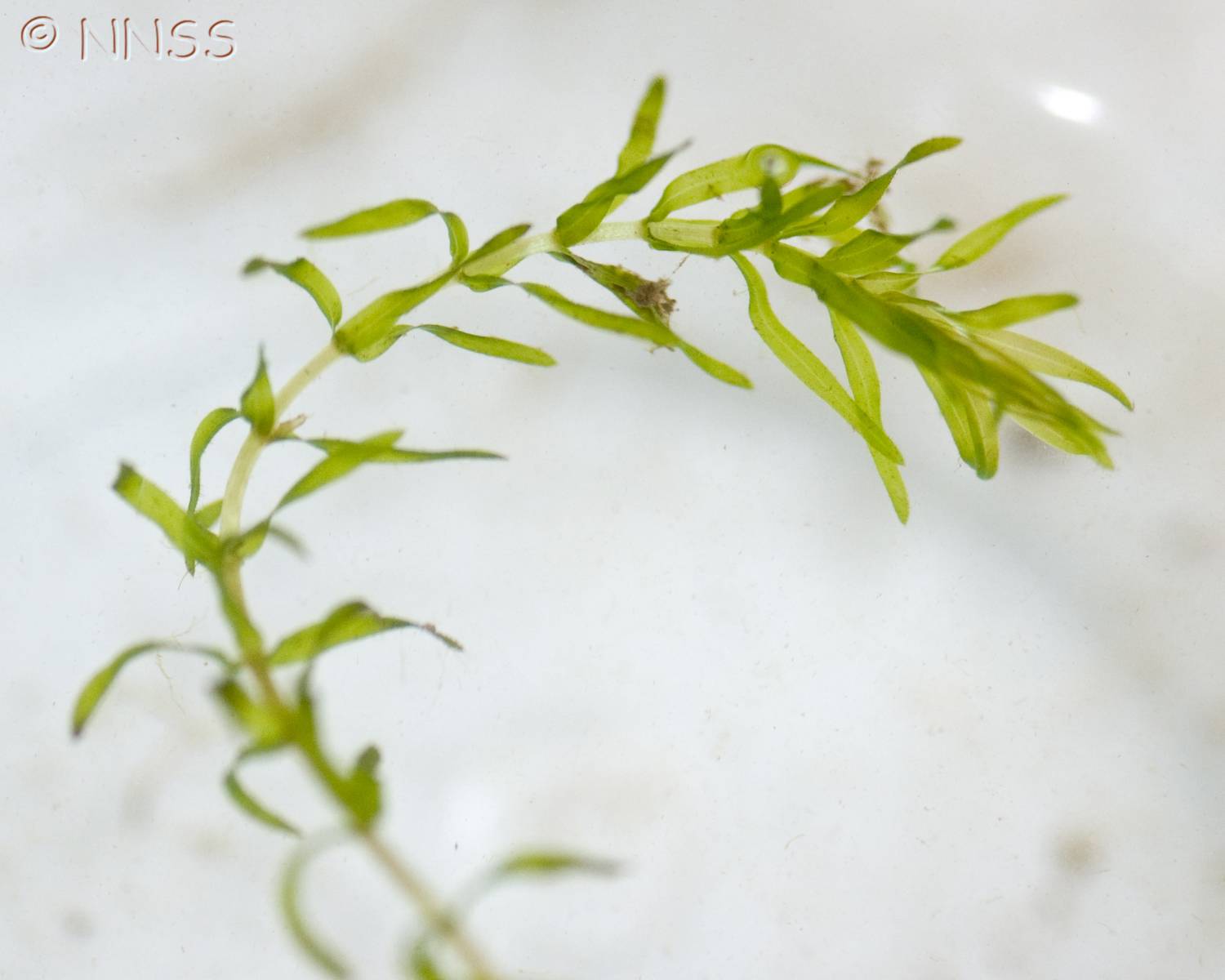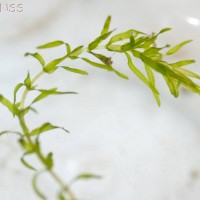
- Elodea nuttallii
Expand and collapse the sections below by clicking on the title or + / - icons.
Short description of Elodea nuttallii,
Nuttall's waterweedis an aquatic herb with branching stems <30 cm long with laves in whorls of (2-)3-4 which are widest near the base the middle, tapering to a point and usually strongly twisted except in dense shade.
Impact summary: Elodea nuttallii,
The actual impact of Nuttall's waterweed is difficult to assess; it certainly occupies large areas of the beds of standing and flowing water bodies which might otherwise support native plants.
Habitat summary: Elodea nuttallii,
Nuttall's waterweed is most abundant in nutrient-rich lakes and ponds both in its native and invasive range; however it will also grow in flowing water, even in areas with fast flow, although it rarely forms dense beds in such conditions.
Overview table
| Environment | Freshwater |
|---|---|
| Species status | Non-Native |
| Native range | Northern America |
| Functional type | Land plant |
| Status in England | Non-Native |
| Status in Scotland | Non-Native |
| Status in Wales | Non-Native |
| Location of first record | v.c.23 |
| Date of first record | 1966 |
Origin
Nuttall's waterweed is native to temperate North America, it was first recorded in Europe in Belgium in 1939
First Record
Nuttall's waterweed was first recorded from a ditch at Beard Mill, Stanton Harcourt in 1966.
Pathway and Method
Nuttall's waterweed became established in GB by accidental or deliberate release after import for ornamental purposes in aquaria and ponds. It probably moved from artificial to natural sites as a result of fragments being transported by stock or by man, such as on fishing equipment or boats.
Species Status
Nuttall's waterweed occurs as an alien in Japan (where all populations are male) and continental Europe (where all plants are female), particularly the north and west. Until about 1995, it showed little sign of significant increase, with records from fewer than fifty 10km squares until then. However by 2000 there were records from 800 10km squares, rising to over 1000 today. The most significant increase occurred between 1995 and 2000 and may actually be an artefact of improved identification and increased recording for the atlas.
Dispersal Mechanisms
All plants in the UK are female, although one population involving male plants was recorded near Edinburgh between 1879 and 1903; all dispersal must therefore be by vegetative means and is likely to be by fragments.
Reproduction
Reproduction is almost certainly predominantly from fragments, although turions are produced in the autumn.
Known Predators/Herbivores
Nuttall's waterweed is preyed upon by a high number of freshwater organisms including fish and birds, but none of these have been shown to have a significant effect on Nuttall's waterweed in GB.
Resistant Stages
None known.
Habitat Occupied in GB
Nuttall's waterweed is most abundant in nutrient-rich lakes and ponds both in its native and invasive range; however it will also grow in flowing water, even in areas with fast flow, although it rarely forms dense beds in such conditions.
Nuttall's waterweed is widespread and abundant throughout England south of the Pennines. Outside this area, there are a few localised concentrations but it is mainly absent or scattered.
Environmental Impact
It is difficult to assess the impact of Nuttall's waterweed on natural ecosystems in GB. It typically occurs in more eutrophic water bodies, where it may replace populations of native taxa, but in general it appears to behave as would a native taxon.
Health and Social Impact
None known.
Economic Impact
None known.
Identification
Stace, C.A. (2010) New flora of the British Isles, Third Edition, Cambridge University Press, Cambridge.
Lansdown, R.V. (2009) A field guide to the riverine plants of Britain and Ireland, Ardeola, Stroud, Gloucestershire.
Biology, ecology, spread, vectors
www.nerc-wallingford.ac.ukresearchcapmpdf files25 Elodea nuttallii.pdf
Management and impact
www.nerc-wallingford.ac.ukresearchcapmpdf files25 Elodea nuttallii.pdf
General
www.nerc-wallingford.ac.ukresearchcapmpdf files25 Elodea nuttallii.pdf
https://www.cabi.org/isc/datasheet/20761
https://secure.fera.defra.gov.uk/nonnativespecies/downloadDocument.cfm?id=618
Spotted this species?
Distribution map
View the Distribution map for , Elodea nuttallii from BSBI
Risk assessment
Risk assessment for Elodea nuttallii. See a full list of non-native species Risk assessments.
ID Sheet
ID Sheet for Elodea nuttallii . See a full list of non-native species ID Sheets.
Legislation
This species is:
- A Species of Special concern
- Listed under Schedule 9 of the Wildlife and Countryside Act 1981
Read more about Non-native species legislation.

